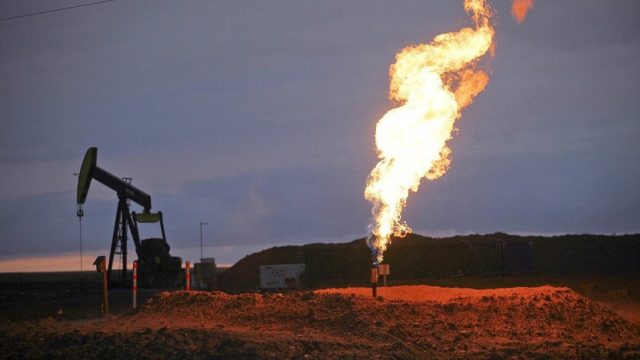Industrial Commission Almost Punished Oil Company For Trying To Curb Flaring

The North Dakota Industrial Commission – the triumvirate of statewide elected officials which oversees, among other things, oil and gas development in the state – has set goals for reducing flaring, or the burning off of excess natural gas produced during oil development.
Companies which don’t hit those goals can be hit with a fine of up to $12,500 per day.
In December Hess didn’t hit their goal, and while the Industrial Commission gave the company an exception, Governor Jack Dalrymple and Attorney General Wayne Stenehjem expressed hostility toward future exceptions:
“Really anytime there’s surplus gas being flared, it should be initially a violation,” Dalrymple said. “And we should have a set policy on exactly how we would penalize that. Then we can hear what the mitigating circumstances are.” …
“We don’t want them to think that a variance is going to be a pro forma thing,” Stenehjem said. “The burden’s on them, as far as I’m concerned.”
Agriculture Commissioner Doug Goehring was the exception, saying he felt the exception for Hess was reasonable. And it was reasonable, because the reason why Hess didn’t hit their flaring target is because they had to shut down their gas capture machinery in order to install upgrades which, in turn, were delayed because of a late delivery.
Hess was adding capacity at its Hawkeye Compressor Station near New Town to process more natural gas, but the company had to shut down some operations for 24 days in November and December. The work was planned months earlier, but the equipment was delivered late, said Director of Mineral Resources Lynn Helms.
As a result, Hess captured 72 percent of natural gas in December while the Industrial Commission’s goal was 74 percent, Helms said. The company asked for temporary limited relief from the flaring goals, which the commission began enforcing Oct. 1.
It would be one thing if there were some evidence that Hess or another company in a similar situation was acting in bad faith. If they were inventing delivery delays and other issues in order to avoid flaring regulations. But there’s no evidence of that in this case. Rather, what we have is a company making a good-faith effort to comply with the law and getting punished for it (with words if not action).
The Industrial Commission has taken some heat in the past from activists and certain media voices for supposedly being too lax in their oversight of oil and gas development, so it’s understandable that they’d want to be seen and heard taking these issues seriously. They want to appear to be enforcing the law.
But the pressure they get shouldn’t cause them to take leave of common sense. While some activists think the proper position of oil and gas regulators is one of adversity and hostility to the industry, traditionally North Dakota’s approach has been a cooperative one. The point, after all, is not to see how many fines we can levy. The goal is to reduce flaring.
I don’t think punishing companies for good faith efforts to achieve that goal is the right path.




